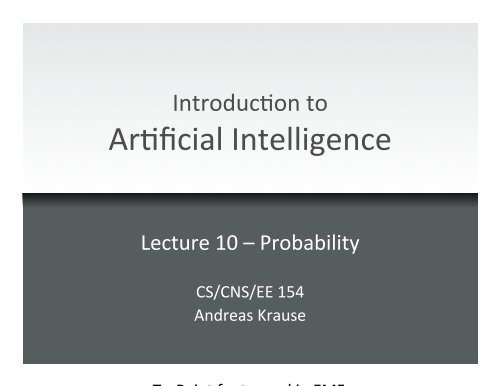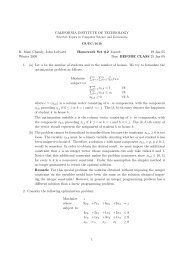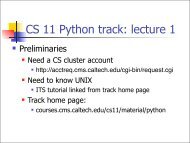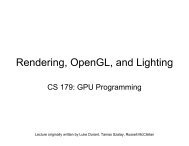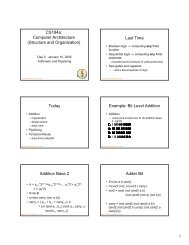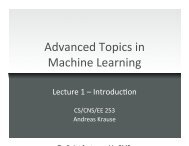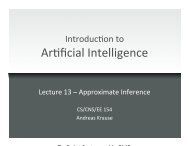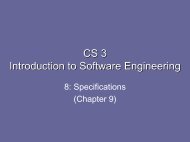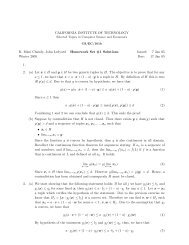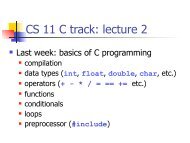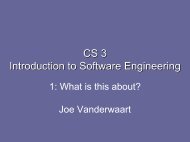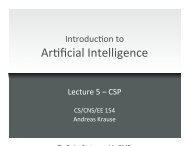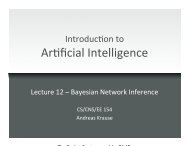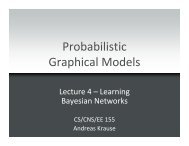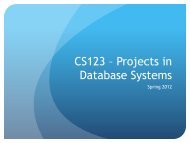Probability - Caltech
Probability - Caltech
Probability - Caltech
Create successful ePaper yourself
Turn your PDF publications into a flip-book with our unique Google optimized e-Paper software.
Introduc)on to Ar)ficial Intelligence Lecture 10 – <strong>Probability</strong> CS/CNS/EE 154 Andreas Krause
Announcements ! Milestone due Nov 3. Please submit code to TAs ! Grading: PacMan ! Compiles? ! Correct? (Will clear maze within 5 minutes) ! Reasonable performance? (Time to clear maze < 1.5*Time taken by baseline) ! Beat baseline? (Eat more dots than baseline) ! Top 4 teams ! Winner
Announcements ! Grading: AvianAsker. Goal: Minimize #ques)ons/guesses ! Compiles? ! Correct? (Will correctly iden)fy bird within 300 ques)ons) ! Reasonable performance? (#Ques)ons/guesses < 1.5 Baseline) ! Beat baseline? (
Probabilis)c AI ??
Quan)fying Uncertainty ! So far, we have mainly focused on determinis)c environments ! Ocen, ac)ons can have uncertain outcomes ! Sensor observa)ons are noisy ! One approach: Nondeterminis)c ac)ons / observa)ons ! Not specified which outcome is more likely ! Purely qualita)ve model of uncertainty 5
Problems with Nondeterminism ! Mo)on model: some)mes, actual direc)on is off by 45 degrees of intended direc)on ! Nondeterminis)c planning finds no feasible solu)on ! Suppose, error occurs with at most 20% chance.. What should we do? 6
Decision making under uncertainty ! Which path should we choose? 7
Review: <strong>Probability</strong> ! Describe probability of events ! P( Pit at [2,2] ) ! P( Wumpus dead ) ! P( A v B ) ! Formally: <strong>Probability</strong> Space ! Set of “atomic events”: ! Set of all non-‐atomic events: is a σ-‐Algebra (closed under complements and countable unions) ! <strong>Probability</strong> measure For , is the probability that event happens 8
Why use probabili)es? Related events must have related probabili)es Ω Agents that bet according to beliefs that violate probability axioms can be forced to lose in expecta)on (de Fineq 1931) 9
Independent events ! Two random events A, B are independent iff ! Events A 1 , A 2 , …, A n are independent iff
Interpreta)on of probabili)es ! Philosophical debate.. ! Frequen)st interpreta)on ! P(ω) is rela)ve frequency of ω in repeated experiments ! Ocen difficult to assess with limited data ! Bayesian interpreta)on ! P(ω) is “degree of belief” that ω will occur ! Where does this belief come from? ! Many different flavors (subjec)ve, objec)ve, pragma)c, …) ! For now assume probabili)es are known 11
Random variables ! Events are cumbersome to work with. ! Let D be some set (e.g., the integers) ! A random variable X is a mapping ! For some , we say “probability that variable X assumes state x” 12
Examples ! Bernoulli distribu)on: “(biased) coin flips” D = {H,T} Specify P(X = H) = p. Then P(X = T) = 1-‐p. Note: can iden)fy atomic events ω with {X=H}, {X=T} ! Binomial distribu)on counts the number of heads ! Categorical distribu)on: “(biased) m-‐sided dice” D = {1,…,m} Specify P(X = i) = p i , s.t. ∑ ι p i = 1 ! Mul)nomial distribu)on counts the number of outcomes for each side 13
Con)nuous distribu)ons ! <strong>Probability</strong> density 14
Example: Gaussian distribu)on ! σ = Standard devia)on ! µ = mean 15
Joint distribu)ons ! Instead of random variable, have random vector ! Can specify P(X 1 =x 1 ,…,X n =x n ) directly (atomic events are assignments x 1 ,…,x n ) ! Joint distribu)on describes rela)onship among all variables ! Example: 16
Example: Mul)variate Gaussian 17
Probabilis)c proposi)onal logic ! Suppose we would like to express uncertainty about logical proposi)ons ! Birds can typically fly ! Proposi)onal symbols Bernoulli random variables ! Specify for all ! Events encode assignments to all proposi)onal symbols ! <strong>Probability</strong> of a proposi)on φ is the probability mass of all models of φ (i.e., all ω that make φ true) 18
Marginal distribu)ons What is P(Toothache)? Joint distribu)on 19
Condi)onal distribu)ons ! Condi)onal (or posterior) probabili)es. E.g., ! Condi)onal distribu)ons specify values for all state combina)ons ! New evidence can change posterior belief 20
Condi)onal distribu)ons ! Formal defini)on: = ! Product rule ! For distribu)ons: (set of equa)ons, one for each instan)a)on of A,B) ! Chain rule: 21
Example: Condi)onal distribu)ons What is P(Toothache|cavity)? Joint distribu)on 22
Posterior inference ! Suppose we know: ! Prior probability P(C) ! Likelihood P(T | C) .1 .9 .9 .1 .01 .99 ! How do we get 23
Problems with high-‐dim. distribu)ons ! Suppose we have n proposi)onal symbols ! How many parameters do we need to specify P(X 1 =x 1 ,…,X n =x n )? 24
Independent RVs ! What if RVs are independent? RVs X 1 ,…,X n are independent, if for any assignment P(X 1 =x 1 ,…,X n =x n ) = P(x 1 ) P(x 2 ) … P(x n ) ! How many parameters are needed in this case? ! Independence too strong assump)on… Is there something weaker? 25
Key concept: Condi)onal independence ! How many parameters? ! If I know there’s a cavity, knowing toothache won’t help predict whether the probe catches 26


